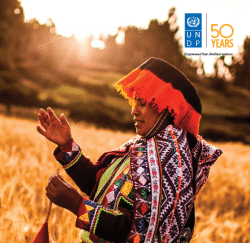
Policy highlights:
- Vulnerable social groups are often excluded from social protection programmes (SPPs) because such programmes fail to address the structural drivers of deprivation and inequality, such as social norms and institutions.
- For SPPs to effectively contribute to sustainable and inclusive transformation, policymakers should adhere to key principles. For example, they should ensure human rights and non-discrimination, foster gender equality and women’s empowerment, and provide a continuum of protection throughout people’s lives.
- These general principles should be supplemented by practical measures in relation to the design and implementation of SPPs. Policymakers should: 1) ensure policy coherence (i.e. SPPs should form a coordinated system of interacting and complementary programmes); 2) adjust SPPs to the specific needs of different groups to ensure that they reach those who need to be reached; 3) establish an explicit link between social protection and environmental sustainability (e.g. by promoting more sustainable use of natural resources), thereby reducing the vulnerability of households to climate risks; and 4) treat SPPs as a profitable investment in both individuals and (economic) development in general.










